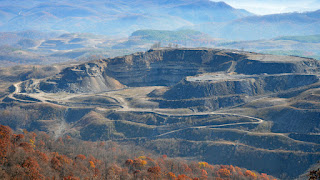The nonpartisan Government Accountability Office is urging Congress to make coal mining companies pay for environmental clean-up and reduce the risk to taxpayers.
A US federal agency has asked Congress to consider banning coal mine “self-bonding”, a controversial practice that can leave taxpayers paying to clean up disused sites.
The recommendation came in a report published on Thursday by the nonpartisan Government Accountability Office (GAO). It is a high-profile attack on self-bonds, which allow companies to guarantee environmental clean-up without providing any collateral.
As Climate Home News found in our Reclaiming coal investigation, an Obama-era crackdown on self-bonding has stalled under the Trump Administration.
Senator Maria Cantwell, who requested the report as the ranking member of the Senate Energy and Natural Resources Committee, said in a statement: “I welcome GAO’s recommendation to pass responsible legislation making coal companies clean up pollution. [Interior Secretary Ryan Zinke] should also reverse course and crack down on this irresponsible coal mining practice.”
GAO found that self-bonds accounted for about 12% of the $10.2 billion of reclamation guarantees held across the US in 2017. Collateral covered another 12%, while the remainder was in the form of sureties, which are insurance policies taken out by mining companies and guaranteed by a third party.
That is in line with CHN’s independent analysis, which found nearly $1bn of self-bonds remaining. The figure had fallen from $3.86bn in mid-2016, as major mining companies went bankrupt and were required to replace self-bonds with safer financial guarantees to go back into business.
The GAO report noted that in some cases, state regulators did not compel struggling companies to replace their self-bonds with safer financial guarantees out of concern the additional burden would push companies deeper into financial distress.
“If a self-bonded operator entered into bankruptcy and doesn’t offer a different type of financial assurance or can’t complete the required reclamation, then the regulatory authority and taxpayers potentially would have to assume that risk of paying for reclamation,” said Anne-Marie Fennell, a director in GAO’s Natural Resources and Environment division who led the writing of the report.
The Western Organization of Resource Councils (WORC), a group representing Western landowners and the environment, released its own report on Thursday, which made the case that the low level of remaining self-bonds makes it the perfect time to convert all self-bonds to safer financial assurances. WORC’s report argues that sureties appear to be available at relatively low prices and that companies still holding self-bonds have good credit ratings, meaning they can afford sureties.
Read more at US Agency Calls for Ban on Controversial Coal Mine ‘Self-Bonds’

No comments:
Post a Comment